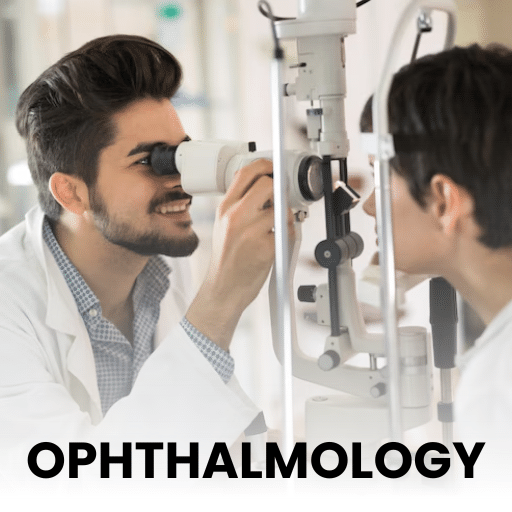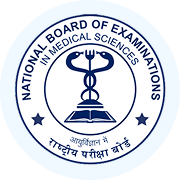
|
INFINITY COURSE
Ophthalmology for NEET PG326 students learning this week · Last updated on Oct 22, 2025 |
Ophthalmology Study Material
Trending Courses for NEET PG
Ophthalmology for NEET PG Exam Pattern 2025-2026
Ophthalmology Exam Pattern for NEET PG
The National Eligibility cum Entrance Test for Postgraduate (NEET PG) is a crucial examination for aspiring postgraduate medical students in India. Understanding the exam pattern for the Ophthalmology section is essential for effective preparation. Here’s a detailed overview:
1. Exam Format
- Type of Exam: Computer-Based Test (CBT)
- Duration: 3 hours and 30 minutes
- Total Questions: 200 Multiple Choice Questions (MCQs)
2. Distribution of Questions
The Ophthalmology section typically comprises a specific number of questions. Here's how it is distributed:
- Ophthalmology Questions: Approximately 10-15 questions
- Other Subjects: Remaining questions are from various subjects including Anatomy, Physiology, and General Medicine.
3. Marking Scheme
- Correct Answer: +4 marks
- Incorrect Answer: -1 mark (negative marking)
- Unattempted Questions: 0 marks
4. Syllabus Overview
The Ophthalmology syllabus for NEET PG includes:
- Basic Concepts: Eye anatomy, physiology, and common diseases.
- Clinical Skills: Diagnosis and management of ocular conditions.
- Recent Advances: New technologies and treatment modalities in Ophthalmology.
5. Preparation Tips
- Understand the Concepts: Focus on the fundamentals of eye anatomy and diseases.
- Practice MCQs: Regularly attempt practice questions to enhance speed and accuracy.
- Stay Updated: Keep abreast of the latest developments in the field of Ophthalmology.
6. Conclusion
Preparing for the Ophthalmology section of the NEET PG requires a solid understanding of the subject and consistent practice. By familiarizing yourself with the exam pattern and focusing on key topics, you can enhance your chances of success in the examination.
Ophthalmology Syllabus 2025-2026 PDF Download
NEET PG Ophthalmology Syllabus
The NEET PG Ophthalmology syllabus is designed to ensure that candidates are well-versed in the essential topics necessary for a comprehensive understanding of ophthalmology. Below is a detailed breakdown of the NEET PG Ophthalmology syllabus, including key areas and focus points.
NEET PG Diseases of Lens
- Cataract: Types, causes, clinical features, management.
- Lens Opacities: Classification and implications.
- Complications: Post-operative complications and management.
NEET PG Glaucoma
- Types of Glaucoma: Primary, secondary, congenital.
- Diagnosis: Tonometry, visual field testing, optic nerve evaluation.
- Treatment: Medical, surgical, and laser therapies.
NEET PG Cornea
- Corneal Diseases: Keratitis, dystrophies, and infections.
- Corneal Surgery: Transplantation and refractive surgery.
- Corneal Anatomy: Layers and their functions.
NEET PG Conjunctiva
- Conjunctivitis: Types, causes, and management.
- Conjunctival Tumors: Benign and malignant lesions.
- Conjunctival Anatomy: Structure and function.
NEET PG Sclera and Episclera
- Scleral Diseases: Scleritis, episcleritis, and scleral thinning.
- Surgical Interventions: Scleral buckling techniques.
NEET PG Uveitis
- Classification: Anterior, posterior, and panuveitis.
- Causes: Infectious and non-infectious etiologies.
- Treatment: Corticosteroids and immunosuppressive therapy.
NEET PG Orbit
- Orbital Anatomy: Structure and function.
- Orbital Pathologies: Tumors, trauma, and infections.
NEET PG Ocular Adenexae
- Eyebrows, Eyelids, and Lacrimal System: Anatomy and functions.
- Diseases: Tumors, infections, and congenital abnormalities.
NEET PG Lacrimal Drainage System
- Function: Tear production and drainage.
- Disorders: Blockage and infections.
NEET PG Neurophthalmology
- Visual Pathways: Anatomy and physiology.
- Neurological Disorders: Optic neuritis, papilledema.
NEET PG Fundus
- Fundoscopic Examination: Techniques and interpretation.
- Retinal Diseases: Diabetic retinopathy, retinal detachment.
NEET PG Vitreous
- Vitreous Anatomy: Structure and role in vision.
- Vitreous Disorders: Vitreous hemorrhage and detachment.
NEET PG Squint and Optics
- Types of Squint: Strabismus, esotropia, exotropia.
- Optical Principles: Refraction, lenses, and optical devices.
NEET PG Community Ophthalmology
- Public Health: Epidemiology of ocular diseases.
- Screening Programs: Vision screening in the community.
NEET PG Embryology
- Development of the Eye: Stages of ocular development.
- Congenital Anomalies: Causes and implications.
NEET PG Recent Advances
- Innovations in Treatment: Latest surgical techniques and technologies.
- Research Updates: Ongoing studies and future directions.
Understanding the NEET PG Ophthalmology syllabus is crucial for aspiring candidates. A thorough grasp of these topics will not only prepare them for the examination but also for their future careers in ophthalmology.
This course is helpful for the following exams: NEET PG
How to Prepare Ophthalmology for NEET PG?
How to Prepare Ophthalmology for NEET PG?
Preparing for Ophthalmology in the NEET PG requires a strategic approach. Below are some effective techniques to enhance your studies and ensure you excel in this crucial subject.
1. Understand the Syllabus
Familiarize yourself with the NEET PG Ophthalmology syllabus. It typically covers:
- Basic Anatomy and Physiology
- Common Eye Diseases
- Diagnostic Techniques
- Treatment Protocols
2. Utilize Quality Study Materials
Choose the best resources to study Ophthalmology. Recommended materials include:
- Standard Textbooks like “Ophthalmology” by Kanski
- Lecture Notes and Online Courses specifically designed for NEET PG preparation
- Question Banks that focus on Ophthalmology topics
3. Join a Structured Course
Consider enrolling in a comprehensive Ophthalmology course for NEET PG offered by EduRev. Such courses provide:
- Expert Guidance from experienced faculty
- Interactive Learning with quizzes and discussions
- Regular Assessments to track your progress
4. Practice Previous Year Questions
Solving past NEET PG questions can be invaluable. Focus on:
- Understanding Question Patterns
- Identifying High-Yield Topics
- Time Management Skills during exams
5. Use Visual Aids and Diagrams
Ophthalmology often involves complex structures and processes. To enhance your retention:
- Utilize Diagrams to visualize the anatomy of the eye
- Watch Video Lectures for dynamic explanations
6. Group Study Sessions
Collaborating with peers can help reinforce concepts. During these sessions:
- Discuss Difficult Topics
- Quiz Each Other on Ophthalmology facts
7. Stay Updated with Recent Advances
Ophthalmology is a rapidly evolving field. To stay current:
- Follow Journals and publications
- Attend Webinars related to Ophthalmology
8. Take Care of Your Health
Preparation can be stressful. Remember to:
- Maintain a Healthy Diet
- Get Adequate Sleep
- Incorporate Regular Exercise into your routine
Conclusion
By following these strategies, you can effectively prepare for Ophthalmology in the NEET PG. Leveraging a well-structured Ophthalmology course from EduRev can enhance your understanding and boost your confidence as you approach the exam.
Feel free to use or modify the HTML content as needed!
Importance of Ophthalmology for NEET PG
Importance of Ophthalmology Course for NEET PG
Ophthalmology is a vital branch of medicine that focuses on the diagnosis and treatment of eye disorders. For aspiring medical professionals preparing for the NEET PG examination, an in-depth understanding of ophthalmology is crucial. Here are several reasons why enrolling in an Ophthalmology course, such as the one offered by EduRev, can significantly enhance your preparation and career prospects.
1. Comprehensive Knowledge Base
The Ophthalmology course provides a thorough grounding in the anatomy, physiology, and pathology of the eye. This foundational knowledge is essential for:
- Understanding common eye diseases
- Recognizing symptoms and clinical signs
- Making accurate diagnoses
2. Clinical Skills Development
Hands-on experience is vital in any medical field. The Ophthalmology course includes:
- Practical sessions on eye examination techniques
- Training on diagnostic tools and procedures
- Opportunities to engage in clinical simulations
3. Importance in NEET PG Exam
Ophthalmology is an essential component of the NEET PG syllabus. Mastery of this subject can help you:
- Answer questions related to visual sciences
- Tackle clinical case scenarios effectively
- Improve overall exam performance
4. Career Opportunities
A strong foundation in ophthalmology opens up various career paths, such as:
- Specialization in pediatric ophthalmology
- Pursuing a career in retinal surgery
- Engaging in academic and research roles
5. Contribution to Public Health
With increasing rates of ocular diseases globally, ophthalmologists play a critical role in:
- Preventing blindness
- Educating communities about eye health
- Developing programs for vision screening and rehabilitation
6. Interdisciplinary Approach
Ophthalmology intersects with various medical fields, enhancing your understanding and skills in:
- Neurology (visual pathways)
- Endocrinology (diabetic retinopathy)
- General medicine (systemic diseases affecting vision)
Conclusion
In summary, the Ophthalmology course for NEET PG offered by EduRev is an invaluable resource for medical students. By deepening your knowledge and honing your clinical skills, you will be better equipped to excel in the NEET PG examination and your future medical career. Investing time in this specialized course not only enhances your academic performance but also prepares you to make a significant impact in the field of eye care.
Ophthalmology for NEET PG FAQs
| 1. What are the common eye diseases that ophthalmologists treat? |  |
| 2. What is the importance of regular eye exams? |  |
| 3. How does one prepare for an ophthalmology exam in NEET PG? |  |
| 4. What are the treatment options for cataracts? |  |
| 5. What is glaucoma and how is it managed? |  |
| 6. What are the signs and symptoms of diabetic retinopathy? |  |
| 7. Can children develop eye problems, and what should parents watch for? |  |
| 8. What is the role of an ophthalmologist in treating eye injuries? |  |
| 9. What are common tests performed during an eye exam? |  |
| 10. How does aging affect eye health? |  |
| 11. What lifestyle changes can promote better eye health? |  |
| 12. What is the significance of vision correction methods like glasses and contact lenses? |  |
| 13. What is the process for diagnosing an eye condition? |  |
| 14. How can technology improve eye care? |  |
| 15. What advice is given to patients after eye surgery? |  |
Best Coaching for Ophthalmology for NEET PG
Tags related with Ophthalmology for NEET PG

|
View your Course Analysis |

|

|
Create your own Test |

|


































